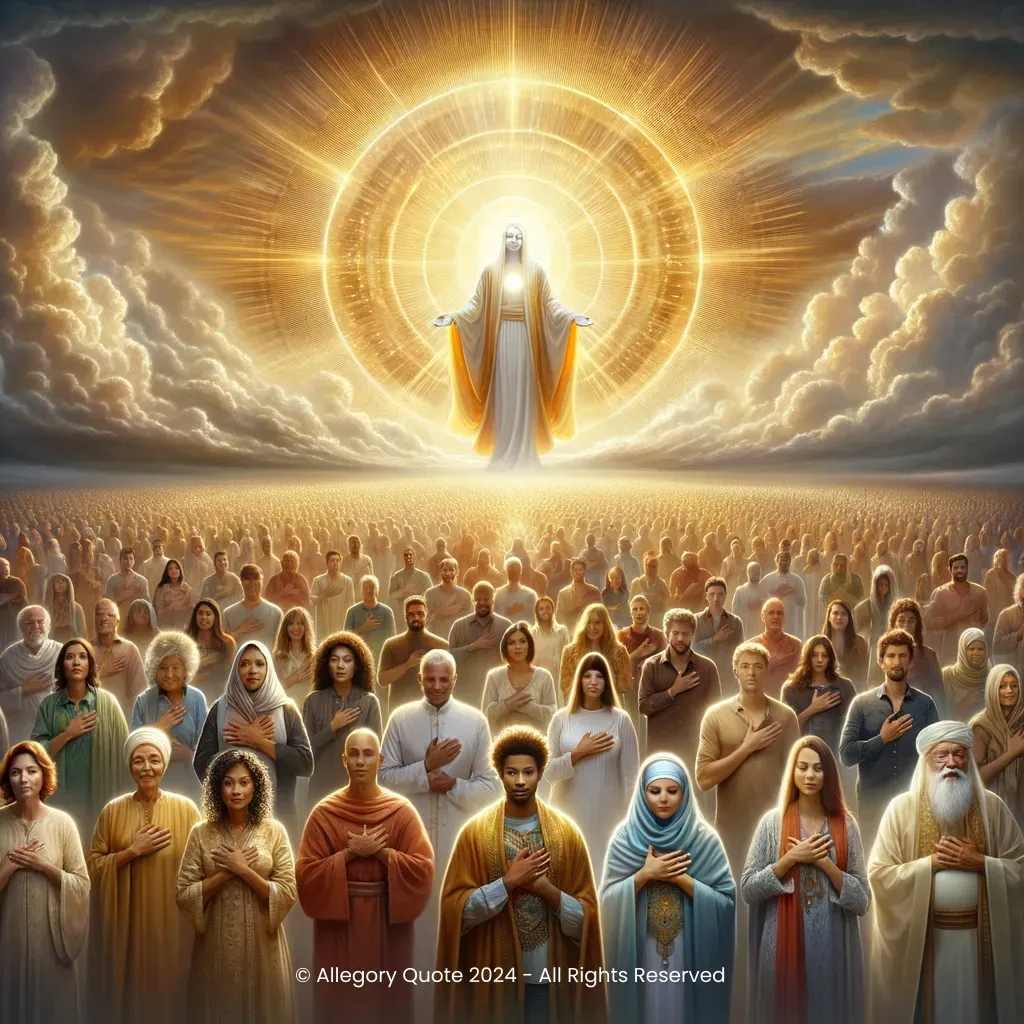”Every tongue should confess that Jesus Christ is Lord,
to the glory of God the Father“

0
0
0
0
- Meaning
- This phrase carries a profound theological meaning. It asserts the universal acknowledgment of Jesus Christ's lordship and divinity. The idea is that every person, regardless of their background or beliefs, will eventually recognize Jesus as the sovereign Lord. This acknowledgment is not merely a verbal confession but signifies a deep, heartfelt belief meant to bring glory to God the Father. This aligns with Christian teachings on salvation, worship, and the ultimate victory of Jesus Christ.
- Allegory
- The serene, radiant figure of Jesus Christ mirrors the divine light of truth and lordship, central to the phrase. The diverse crowd beneath Him signifies humanity's universal acknowledgment of His sovereignty across all cultures and backgrounds. Their expressive, heartfelt gestures symbolize sincere and contemplative confession. The majestic golden light above Jesus represents the glory of God the Father, illuminating the scene with divine approval and warmth. The expansive horizon with glowing clouds emphasizes the all-encompassing nature of faith, implying that this confession transcends earthly boundaries, bringing a sense of unity and peace to believers worldwide.
- Applicability
- This phrase can be applied to personal life by encouraging individuals to openly express their faith and beliefs. For Christians, it serves as a reminder of their duty to evangelize and live in a manner that glorifies God. It can also inspire a sense of unity and purpose among believers, reinforcing the idea of a shared faith and mission.
- Impact
- This phrase has had a monumental impact on Christian theology and worship. It is often cited in Christian liturgy, hymns, and sermons. The declaration of Jesus Christ as Lord is central to Christian creeds and has unified believers across different denominations. The phrase also plays a significant role in Christian apologetics and evangelism, shaping doctrinal teachings about the nature of Christ and the path to salvation.
- Historical Context
- The Epistle to the Philippians was written around AD 60-62 while Paul was in prison, likely in Rome. This historical context is crucial as it highlights the strength of Paul's faith and commitment despite his circumstances. His writings during this period were meant to encourage and instruct early Christian communities.
- Criticisms
- Criticisms and controversies often arise from differing interpretations of what it means to confess Jesus Christ as Lord and how this acknowledgment translates into practice. Some argue that such exclusivist claims may clash with pluralistic views in a modern, multicultural society. Others debate the implications for individuals who do not share the Christian faith, questioning the concept of universal acknowledgment.
- Variations
- Variations of this phrase can be found across different Bible translations, but the core message remains the same. Different cultures and denominations may interpret and emphasize various aspects of this confession. For example, Eastern Orthodox, Roman Catholic, and Protestant traditions may use it differently in liturgical practices, doctrinal teachings, and personal devotion.
-

Do unto others as you would have them do unto you.
-

Beyond the sphere that widest orbit swings, passes the sigh that leaves my heart below.
-

So that at the name of Jesus every knee should bow, in heaven and on earth and under the earth.
-

Infinite goodness has such wide arms, that it embraces all that turns to it.
-

Love is blind, and lovers cannot see the pretty follies that themselves commit.
-

You will taste how salty another's bread is, and how hard it is to tread another's stairs up and down.
-

The truth shall set you free.
-

In His will is our peace.
-

While there's life, there's hope.
-

To weep is to make less the depth of grief.
-

A prophet is without honor in his own country.
No Comments